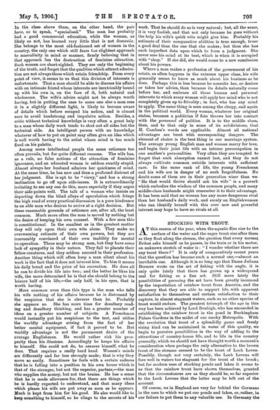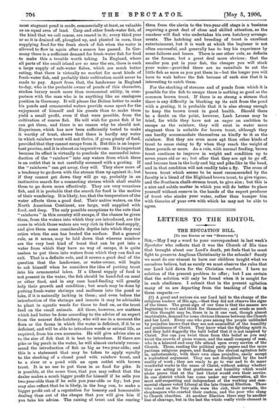STOCKING WITH TROUT.
AT this season of the year, when the aquatic flies rise to the surface of the water and the eager trout rise after them as they float along the stream, tbe question that every normal Briton asks himself as he passes, in the train or in his motor, an unknown stretch of water is : "I wonder whether there are any trout there P" It is only of comparatively recent years that the question has become such a normal one,—almost an inevitable one. Although it is so long ago that Dame Juliana Berners wrote on the art of fishing with the angle, it is only quite lately that there has grown up a widespread zeal for fishing as a fine art. Still more lately the possibilities of pursuing the art have been greatly increased by the importation of rainbow trout from America, and the discovery that they are able to support life, with apparent satisfaction to themselves and certain satisfaction to their captors, in almost stagnant waters, such as no other species of trout would endure. The greatest triumph of the ago in this way has been achieved by Lord Denbigh, who has succeeded in establishing the rainbow trout in the pond in Buckingham Palace Gardens in the midst of our smoky Metropolis. With the revelation that trout of a splendidly game and freely rising kind can be maintained in water of this quality, we begin to perceive possibilities in the way of adding to the attractions of country-house life, and to life in the country generally, which we should not have thought worth a moment's consideration when perhaps the only alternative to the brown trout of the streams seemed to be the trout of Loch Leven. Possibly, though not very certainly, the Loch Levens will fare well in waters too stagnant for the trout of the brook; but for modern uses of stocking ponds and lakes it seems to us that the rainbow trout have shown themselves, granted that the circumstances are as they should be, so far superior to the Loch Levens that the latter may be left out of the account.
Of course, we in England are very far behind the Germans in the uses to which we put our ponds and lakes, or, rather, in our failure to put them to any valuable use. In Germany the most stagnant pond is made, commercially at least, as valuable as an equal area of land. Carp and other fresh-water fish, of the kind that we call coarse, are reared in it; every third year or so it is drained off, ploughed up, and planted in corn, thus supplying food for the fresh stock of fish when the water is allowed to flow in again after a season has passed. In Ger- many there is a sufficient demand for fresh-water fish for food • to make this a trouble worth taking. In England, where all parts of the small island are so near the sea, there is such a large supply of salt-water fishes, which are much better eating, that there is virtually no market for most kinds of fresh-water fish, and probably their cultivation could never be made to pay. Apart from that, the landowner in England to-day, who is the probable owner of ponds of this character, studies luxury much more than economical utility, in com- parison with the man who is in anything like an analogous position in Germany. It will please the Briton better to make his ponds and ornamental waters provide some sport for the enjoyment of himself and his guests than to make them yield a small profit, even if that were possible, from the cultivation of coarse fish. He will wish for game fish if he can get them, and there is no reason why he should not. Experience, which has now been sufficiently tested to make
• it worthy of trust, shows that there is hardly any water in which rainbow trout will not thrive, if given plenty of food, provided that they cannot escape from it. But this is an impor- tant proviso, and it is almost an imperative one. It is important because its effect is virtually to preclude the successful intro- duction of the " rainbow " into any waters from which there is an outlet that is not carefully screened with a grating. If the "rainbows" can get away, they will. They show more of a tendency to go down with the stream than up against it ; but if they cannot get down they will go up, probably in an instinctive search for a connecting stream which shall enable them to go down more effectively. They are very voracious fish, and it is probable that the search for food is the motive of their wandering. It is likely, too, that the temperature of the water affects them a good deal. Their native waters, on the North American Continent, are large, well supplied with food, and deep. The only possible exceptions to the rule that " rainbows " in this country will escape, if the chance be given them, from the waters into which they are introduced, are the cases in which those waters are very rich in their food-supply, and give them some considerable depths into which they can retire when the sun has heated the surface. But a general rule, as it seems, may be laid down that whereas rainbow are the very best kind of trout that can be put into a water from which they have no way of escape, it is quite useless to put them into waters from which they can find an exit. That is a.definite rule, and it covers a good deal of the question that the landowner, or water-owner, will begin to ask himself when he considers the idea of putting trout into his ornamental lakes. If a liberal supply of food is not present in the water, the fish should be hand-fed on meal or other food, and in any case hand-feeding will greatly .help their growth and condition ; but much may be done by putting fresh-water shrimps and molluscs into the pond or lake, if it is naturally lacking in them; and even before the introduction of the shrimps and insects it may be advisable to plant in aquatic weeds for these to feed on, as the trout feed on the small animals. All these, however, are matters which had better be done according to the advice of an expert from the nearest fish-hatchery, who will see in a moment the flora or the fauna in which the water is deficient, if it be so deficient, and will be able to introduce weeds or animal life, as required, from his own nurseries. He will give advice also as to the size of fish that it is best to introduce. If there are pike or big perch in the water, he will almost certainly recom- mend the introduction of fish as big as two-year-olds; and this is a statement that may be taken to apply equally to the stocking of a closed pond with rainbow trout, and to a river or a pond with an open outlet with brown trout. It is no use to put them in as food for pike. It is possible, at the same time, that you may reflect that the dealer makes a much bigger profit for himself if he sells you two-year-olds than if he sells you year-olds or fry; but you may also reflect that he is likely, in the long run, to make a bigger profit out of a reputation for honesty and honourable dealing than out of the cheque that you will give him if you take his advice. The raising of trout and the rearing
them from the alevin to the "two-year-old stage is I business requiring'a great deal of close and skilled attention, as the amateur will find who undertakes his own hatchery arrange- ments. The hatching and breeding of trout is excellent entertainment, but it is work at which the beginner is not often successful, and generally has to buy his experience by some failures and losses. There is one other rule, as definite as the former, but a great deal More obvious : that the smaller you put in your fish, the cheaper you will stock your water—provided there are no cannibals to eat the little fish as soon as you put them in—but the longer you will have to wait before the fish become of such size that it is interesting to catch them.
For the stocking of streams and of ponds from which it is possible for the fish to escape there is nothing so good as the common brown trout. If there is so strong a stream that there is any difficulty in blocking up its exit from the pond with a grating, it is probable that it is also strong enough to keep the brown -trout in good health. Should there be a doubt on the point, however, Loch Levens may be tried, for while they have not as eager an ambition to escape as the rainbow, they will exist in water more stagnant than • is suitable for brown trout, although they can hardly accommodate themselves as kindly to it as the rainbow. But they are even more apt than other kinds of trout to cease rising to fly when they reach the weight of three pounds or more. As a rule, with normal feeding, brown trout continue to improve in weight and condition up to seven years old or so; but after that they are apt to go off, and become lean in the body and big and pike-like in the bead, and in that condition will not readily take a fly. The cross of brown trout which seems to be most recommended by the faculty is 'a blend of the Highland brown trout, to give vigour, and the Southern chalk-stream trout, to give size ; but this is a nice and subtle matter in which you will do better to place yourself without reserve in the hands of the 'expert producer of trout who stocks your water, rather than hamper him with theories of your own with which he may not be able to agree.









































 Previous page
Previous page